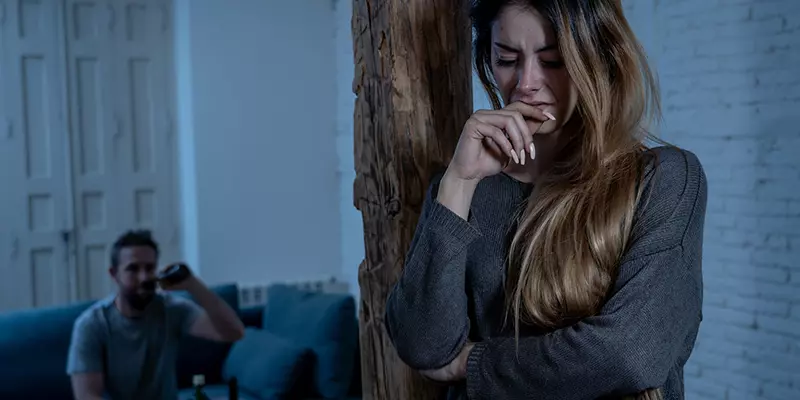
The threat of illness, job losses, social isolation—it’s a recipe for heightened stress, irritability, and anger. But it’s even worse for people who are trapped at home with a domestic abuser.
Sadly, the coronavirus pandemic has created a sort of perfect storm for domestic violence. Reports of increases in partner abuse, child abuse, and pet abuse are emerging across the nation and around the world. According to a study in Forensic Science International: Reports, incidences of domestic violence have risen 40-50% in Brazil and are up 30% in France. In the U.K., the BBC reported that calls to the National Domestic Abuse helpline saw a 25% increase since the lockdown began. And in the U.S., hotlines are reporting a spike in calls.
Abusers often use tactics, such as isolation from friends and family, as a way to control their victims. Constant scrutiny, restrictions on behavior, and limiting access to necessities (like food and using the bathroom) are other common strategies. With the world on lockdown, this has given perpetrators a stronger weapon in their arsenal.
For victims, it’s made it more challenging to be able to reach out to friends or a support network for help without their abuser’s knowledge. And it’s preventing them from escaping the situation by leaving home when things turn violent. Going to a shelter may not be an option now for fear of infection from COVID-19.
This sad situation makes you wonder what makes some people violent? The answer lies in the brain.
Violence and the Brain
The added stressors of the coronavirus pandemic can be contributing to serious anger and violence issues. In some people, violent outbursts may be a sign of a mental health condition called intermittent explosive disorder (IED).
This condition is more commonly seen in people who grew up in an abusive home or in those who have suffered multiple emotional traumas. The likelihood of problems with anger or violent behavior is increased in people with other mental health problems, such as ADD/ADHD or personality disorders. In addition, conditions like anxiety, depression, or substance abuse are seen in over 80% of people who suffer from IED.
In a brain SPECT imaging study performed at Amen Clinics on people who had assaulted another person or damaged property, more than 70% had abnormalities in the left temporal lobe region of the brain. Brain imaging scans indicate that damage to the left temporal lobe or dysfunction in this area of the brain makes people more likely to struggle with irritability, anger, and violent thoughts and behavior.
The temporal lobes, situated on either side of the brain behind the eyes and underneath the temples, are involved with emotional stability, understanding and processing memories, and more. When there is abnormal activity in the temporal lobes, it can be associated with aggression (internally or externally directed), dark or violent thoughts, emotional instability, and other problems.
Temporal lobe problems can come from many sources, the most common being genetics, head injuries, and toxic or infectious exposure. Since the temporal lobes sit in a cavity surrounded by bone on 5 sides (front, back, right side, left side, and underside) they can be damaged by a blow to the head from almost any angle. In fact, the temporal lobes, along with the prefrontal cortex and the anterior cingulate gyrus, are the parts of the brain most vulnerable to damage by virtue of their placement within the skull.
Childhood Trauma and the Brain
For children, being abused or witnessing intimate partner violence can have devastating, long-term effects on the brain and mental health.
In a typical year, an estimated 4.5 to 15 million children experience exposure to physical violence at home. It’s likely that there will be an uptick in these numbers as a result of families being cooped up at home due to the pandemic. This doesn’t bode well for the future generation.
Research in a 2018 issue of JAMA Network Open found that for children, witnessing domestic abuse can cause the same damaging effects as if they had endured the abuse themselves. In addition, brain imaging studies show that childhood trauma—including physical, verbal, and sexual abuse—causes structural changes in the brain that have been linked to a greater risk of mental illness and addictions. For example, a 2016 review of neuroimaging studies in the Journal of Child Psychology and Psychiatry, and Allied Disciplines found that youngsters exposed to abuse experience physical changes in the following areas of the brain:
- Hippocampus: Decreased size in this area that is involved in memory and learning
- Prefrontal cortex: Reduced volume in this region, which plays an important role in impulse control, judgment, planning, and follow-through
- Cerebellum: Less-than-normal volume in this region located at the back of the brain that helps coordinate physical movement and thoughts
- Amygdala: Heightened activity in this area, which is known as the brain’s “fear center”
These brain changes can lead to trouble in many areas of a person’s life, including at school, at work, and in relationships.
Damaged Brains Can Heal
Domestic violence can seem like a hopeless situation with no way out. But decades of brain imaging work and clinical practice at Amen Clinics have shown that there is hope for people in abusive relationships and for children who have suffered emotional trauma. Addressing underlying brain dysfunction is critical to treating IED, as well as for overcoming the lasting consequences of experiencing or witnessing abuse.
Note: If you or a loved one is in an unsafe domestic situation, also consider these resources:
- In an emergency: call 9-1-1
- National Domestic Violence Hotline: 800-799-7233
If you’re struggling with issues that stem from growing up in an abusive family or you’re experiencing domestic violence, Amen Clinics can help. At Amen Clinics, we can help you—and everyone in the family unit—achieve better brain health and a stronger, more fulfilling relationship. During these uncertain times, your mental well-being is more important than ever, and waiting to get treatment until the pandemic is over is likely to make your symptoms worsen over time.
At Amen Clinics, we’re here for you. We offer mental telehealth, remote clinical evaluations, and video therapy for adults, children, and couples, as well as in-clinic brain scanning to help our patients. Find out more by speaking to a specialist today at 888-288-9834. If all our specialists are busy helping others, you can also schedule a time to talk.





Enjoyed the read on the brain. I often think that our brain is the most sophisticated and beautiful creation on our body. It is just amazing what responsibility the brain has to take care of. The overpowering feeling we get when you think about what our brain does.
Comment by John Rauscher — May 15, 2020 @ 4:35 AM
I have gotten out of an abusive marriage of 34 years total 38 years with the abuser. A Malignant Narcissist. My children witnessed so much. They blame me. I stayed one cause I didn’t know really the dept of what was happening,two the fear consumed me because his threats were to take me down. My children have explosive anger. I fear the outburst. My kids are 18 and 25. I want them to get help,they laugh and blame me. I see now my childhood allowed me to be in an abusive relationship. I want to break the cycle.
Comment by Marguerite — May 15, 2020 @ 5:50 AM
Thank you so much for this site, your treatment, and your continued research of such a tragic subject. As a domestic abuse survivor, I have learned an incredible amount of proven information and tried and true methods on reducing and avoiding certain violent situations.
I’m also an adult ADHD’er, who was not diagnosed and/or treated until I was 50 years old. For someone whose life was for the most part ruined by Combined type ADHD, I have a renewed outlook due in part to what I’ve learned from your publications and teachings.
I have been through, literally every single bad situation you can possibly imagine, from homelessness, to drug abuse, to parental neglect, and I can say, that the spousal abuse was by far the most degrading, emotionally taxing and tormenting, physically damaging for me and anyone around me.
I’ve been following your teachings beginning with lectures on public television since long before I was diagnosed and treated, and, it was what I learned there and from Oprah Winfreys interviews of domestic abusers that gave me the knowledge and the courage to get out.
What I would tell others …. my only regret is not getting out sooner. If you have the slightest feeling your situation is bad for you, IT LIKELY IS! Get out now, especially if you have children.
Thank you Dr. Amen and Ms. Tara for all you do and your continued support.
Happy and safe follower,
Lori Marshall
Comment by Lori Marshall — May 15, 2020 @ 7:29 AM
I am so grateful for this Article and The Fact at all this Topic is being able to garner the attention of a serious matter affecting so many, me included! It all starts in the brain. I am currently seeking the courage to END this Cycle. But I still have many fears. I know a bit about importance of brain health and I use my Tools and knowledge to do my best. It’s getting my husband to accept its Long overdue to address his issues. I will leave, but ah really want him to give Dr. Amens program a chance; if not I have to respect myself enough to walk away.
Comment by Nicole — May 16, 2020 @ 4:39 AM
Ok ….. So sorry to learn that the poor abuser has issues with his brain. NOW, this sounds like the judge saying, “My ‘name’. I can’t arrest him. He’s so repentant.” Don’t give me this bull! The abuser is NOT the victim here. Damn …. face it – THE ABUSER IS AN ANIMAL. Period. Any help out there – in any – insists that the woman and her children find a “safe house”. BULL!!!! Why in hell should any woman and her children be the ones to leave their home. The truth is … she leaves and in most cases loses everything and ends up getting nothing as she “deserted”. She is having to start over – buying all new furniture, appliances, et al. If she is fortunate enough to have a job to support her and her children, she still does not have the lifestyle she once had. Now get this ….. after many years of physical abuse – he was finally arrested! For stealing my NY State license plates off my car. THIS, I was told, was a crime against the state. These abusers are animals and deserve no mercy, let alone excuses for their behavior.
Comment by Lynda — May 20, 2020 @ 6:18 AM
I respect the insightful article on amenclinics.com about the pandemic's have an effect on on home violence. It sheds mild on the imperative difficulty of home violence, which has been exacerbated at some point of these difficult times. The article gives treasured facts and highlights the urgency of addressing this issue. Awareness and appreciation are fundamental steps in combatting home violence, and this article contributes to that vital conversation.
Comment by lawyersonia — October 20, 2023 @ 11:02 PM